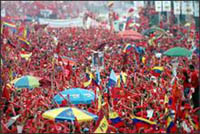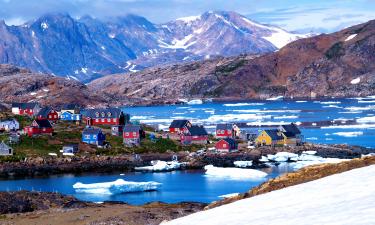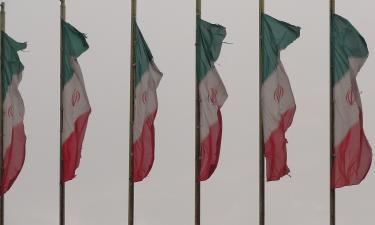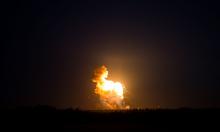Venezuelans believe Chavez to be reelected and deliver a knockout punch to the U.S.
The president of the South American nation seeks his second reelection as promises to crush the opposition and deliver a knockout punch to the U.S.

Venezuelans are split over their president. Many - most of them in the poorest areas of the country - love the leader of the self-proclaimed Bolivarian Social Revolution, as many –most of them in the wealthiest regions of this oil-rich South American nation- hate the “leftist tyrant”. But only 24% of Venezuelans believe President Hugo Chavez could lose Sunday vote to his conservative opponent Manuel Rosales, according to all opinion polls published by the local media.
Last weekend, both candidates closed their political campaigns with huge rallies in the capital. Rosales on Saturday and Chavez on Sunday gathered hundreds of thousands of supporters in the streets of the noisy and hot Caracas. Rosales’ supporters say that opinion polls are being manipulated and their candidate still have good chances to put an end to “seven years of tyranny”. On the contrary, Chavez’s fanatics –usually dressed in red shirts- say they are ok and that they will sweep the opposition.
While followers and detractors of Chavez attend to mass rallies, rumors about clashes between both groups and lack of supply of food and other products flood Caracas. Middle class citizens jump to supermarkets and petrol stations to stock up for the next few weeks, which they consider could be hard, depending on the result of the vote.
“The city is full of rumors about shortage and is more insecure than never”, says Laura Rossi, a 28-year-old clerk in a Caracas bank who will vote for Rosales. “Things are turning to the worse in Caracas nowadays and we cannot even move from our homes when politicians rally”, she added to Pravda.Ru.
Chavez’s supporters are usually more optimistic. “We are going to win on Sunday to defeat Bush’s imperialism”, says Victor Pereyra, a street vendor in downtown Caracas who sells Chavez’s toys that speak against the United States and praise for Socialism and Latin American unity.
The real one, the 52 year-old paratrooper that jumped to power in 1999 to turn this once politically apathetic country upside down, is sure he will win. "Our goal is not to win" the election, Chavez said amid the thunder of fireworks during Sunday’s rally. "We must outdo our previous triumphs. ... We are going to win in a way that is overwhelming, crushing." His rally came a day after hundreds of thousands of Rosales supporters flooded a major highway in one of the largest anti-Chavez demonstrations in years.
But the outspoken Venezuelan leader does not believe that the enemy is at home. That day he told the crowd he would confront the "devil," a term he uses to refer to US President George W. Bush, and that his re-election would deliver a knockout punch to the U.S.
Chavez did not forget his Cuban mentor. "This victory on Dec. 3 ... we're going to dedicate it to the 50 years since the arrival of the revolutionary boat Granma led by Fidel Castro to the coast of Cuba," Chavez said to cheers. "Fidel, applause from Venezuela! Long live Cuba! Long live revolutionary Cuba!"
After seven years in power, Chavez managed to build an independent foreign policy that irritates Washington. But at the same time, he has secure oil shipments to the United States in an increasingly unstable global scenario.
His unprecedented ruling style radicalized after a US backed military coup took him out of power for 48 hours in April 2002. Since then, he changed the Constitution to let him stay in power for a long while, even until the 2030’s.
Rapidly, he developed or deepened close ties with US foes as Iran and Cuba, speeded up a program to modernize the country’s armed forces with Russian weaponry, abandoned the Latin American Andean bloc of US allies, joined the more independent Mercosur bloc –with Argentina and Brazil- and is being supporting anti-US candidates in elections across Latin America.
His high-profile foreign policy registers victories and painful setbacks. In October, Venezuela’s bid to join the UN Security Council was frustrated by an intensive diplomatic campaign displayed by the US State Department, but weeks later, the defeat was compensated with the victory of one of his allies in the Nicaraguan presidential election. More recently, on Sunday, Chavez’s campaign was boosted by the overwhelming victory of Rafael Correa, a leftist economist, in Ecuador’s presidential race.
Chavez can count both victories as own. He is waiting for a third one, next Sunday. 16 million of Venezuelans requested to vote have the answer.
Hernan Etchaleco
Venezuela
Subscribe to Pravda.Ru Telegram channel, Facebook, RSS!





